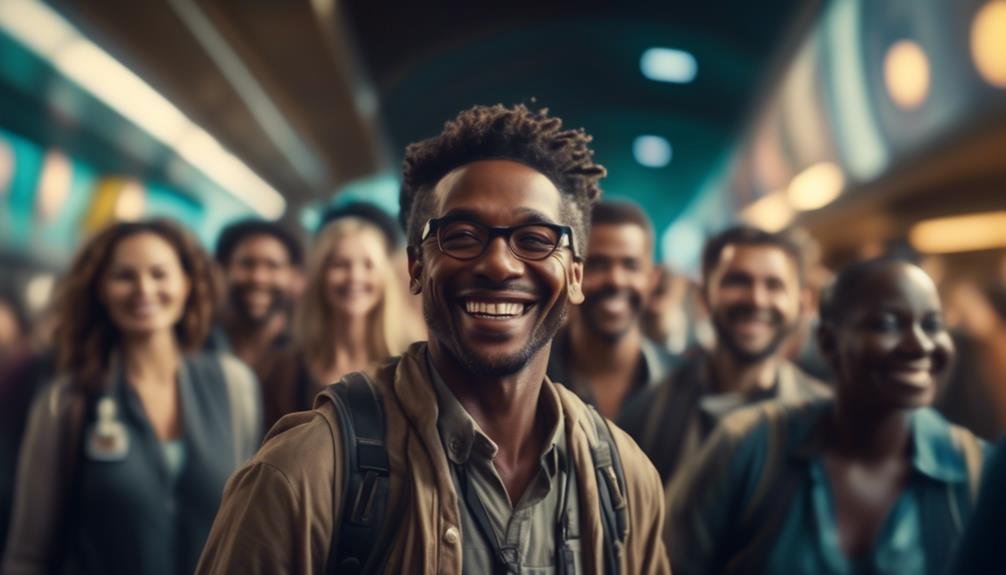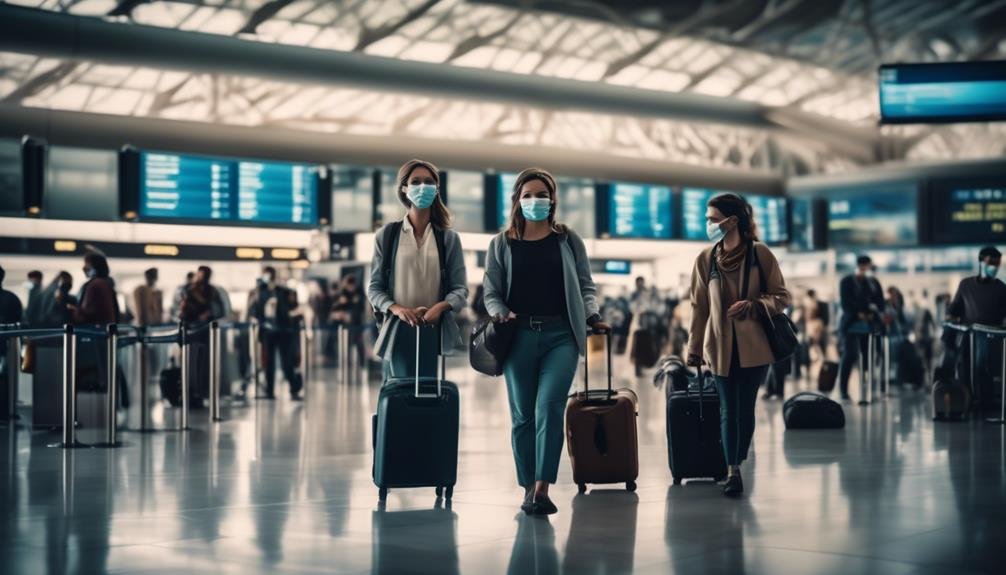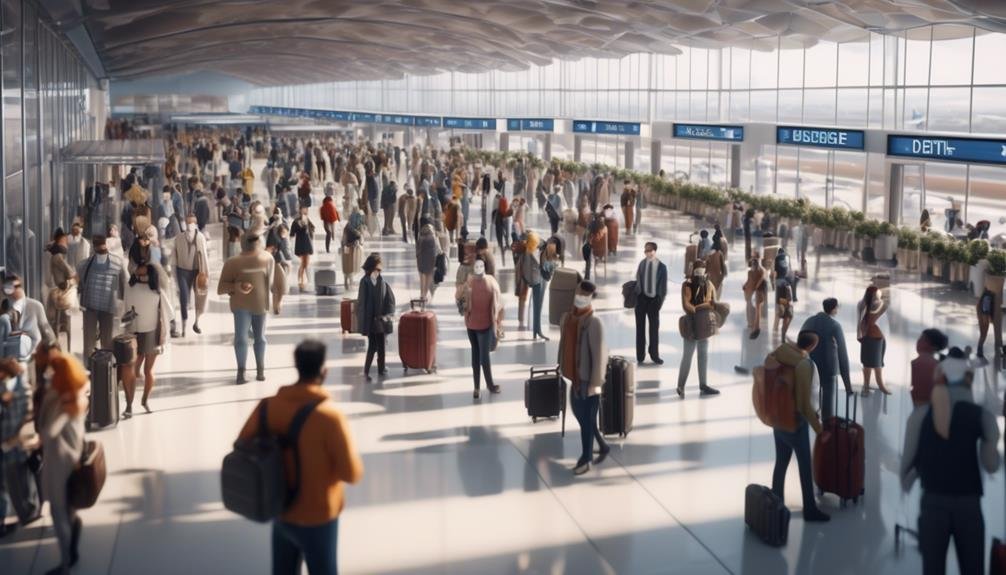The Future of Travel and Tourism Post-Pandemic
Imagine a world where the travel and tourism industry has been completely transformed by the global pandemic. Well, that world is now a reality.
As you look ahead, you might wonder what changes are here to stay and how the industry will evolve. The impact of the pandemic has been profound, and the way we travel and experience tourism will never be the same.
But what does this mean for the future? The answer lies in understanding how consumer behavior, health and safety protocols, and innovative technologies will shape the new landscape of travel and tourism.
Key Takeaways
- Remote work has influenced travel patterns, with a preference for destinations conducive to working remotely.
- There is a surge in demand for sustainable tourism experiences, with consumers prioritizing destinations that practice sustainable practices.
- Health and safety protocols have become a priority, with collaboration with healthcare providers, enhanced sanitation protocols, and investment in contactless technology.
- Rebuilding consumer confidence requires transparent communication, highlighting outdoor and nature-based activities, incorporating wellness offerings, and utilizing data analytics to understand consumer sentiment.
Consumer Behavior Shifts
As the travel and tourism industry emerges from the pandemic, consumer behavior is undergoing significant shifts, driven by changing preferences and heightened awareness of health and safety considerations.
The rise of remote work is reshaping travel patterns, with more individuals seeking destinations conducive to working remotely. This trend is expected to continue, influencing the choice of accommodations and activities that offer a blend of work and leisure.
Sustainable practices are also increasingly influencing consumer decisions, with eco-friendly options gaining traction. Travelers are showing a preference for destinations and businesses that prioritize environmental conservation and community engagement. As a result, the industry is witnessing a surge in demand for sustainable tourism experiences, prompting businesses to adapt and integrate environmentally responsible practices into their offerings.
Looking ahead, consumer behavior is likely to remain centered around flexibility, safety, and sustainability. Understanding and catering to these evolving preferences will be crucial for businesses in the travel and tourism sector to thrive in the post-pandemic landscape.
Health and Safety Protocols
Implementing stringent health and safety protocols is imperative for the travel and tourism industry to regain consumer trust and confidence in the post-pandemic era. As the industry navigates through the aftermath of the pandemic, it's crucial to prioritize the health and safety of travelers and employees. The adoption of robust health and safety measures will be pivotal in shaping the future landscape of travel and tourism.
Key considerations include:
- Healthcare Partnerships: Collaborating with healthcare providers can help in implementing effective testing, vaccination, and health monitoring programs. This can provide travelers with assurance and contribute to a safer travel environment.
- Sanitation Standards: Establishing and adhering to enhanced sanitation protocols across all touchpoints within the travel experience, including accommodations, transportation, and attractions, is essential in mitigating health risks.
- Technology Integration: Investing in innovative technologies such as contactless check-ins, digital health passports, and advanced air filtration systems can further bolster health and safety measures, providing a seamless and secure travel experience.
Rebuilding Consumer Confidence

To rebuild consumer confidence in the travel and tourism industry post-pandemic, a data-driven approach focused on transparent communication and proactive adaptation will be essential.
According to recent surveys, 78% of travelers now consider health and safety their top priority when choosing a destination. Therefore, destination marketing efforts should emphasize stringent health and safety protocols to reassure potential travelers.
In addition, highlighting outdoor and nature-based activities can appeal to individuals' mental health needs, as 62% of travelers express a preference for destinations that offer opportunities for relaxation and stress relief.
Moving forward, the industry must prioritize mental health as a key component of the travel experience. Destinations and travel companies are encouraged to incorporate wellness offerings and promote the mental health benefits of travel.
Utilizing data analytics to understand consumer sentiment and behaviors will be crucial in tailoring marketing strategies to meet evolving consumer needs.
Furthermore, proactive adaptation, such as flexible booking policies and clear communication about cancellation and refund procedures, will instill confidence in travelers and pave the way for a resilient and sustainable recovery.
Embracing Innovative Technologies
Embracing innovative technologies will revolutionize the travel and tourism industry, enhancing efficiency, personalization, and safety for travelers. The integration of virtual experiences and contactless check-in processes will reshape the way people engage with travel and tourism, providing a seamless and secure experience.
- Virtual Experiences: Incorporating virtual reality (VR) and augmented reality (AR) technologies will allow travelers to preview destinations, accommodations, and activities, offering a more immersive and informed decision-making process.
- Contactless Check-In: Implementing advanced digital solutions for check-in processes, such as mobile check-in and keyless entry, will minimize physical touchpoints and reduce wait times, contributing to a safer and more efficient experience for travelers.
- Data-Driven Personalization: Leveraging big data and artificial intelligence (AI), travel companies can offer personalized recommendations and tailored experiences, catering to individual preferences and enhancing overall satisfaction.
Adaptation to New Normal

As travel and tourism continue to evolve, the adaptation to the new normal necessitates a seamless integration of cutting-edge technologies and enhanced safety measures to meet the changing expectations of travelers. In this new era, remote work has become a prevalent trend, and the travel industry must respond by providing tailored services and amenities to cater to this growing demographic. Additionally, virtual experiences are gaining traction as travelers seek innovative ways to explore destinations from the comfort of their homes. Embracing these shifts will be crucial in redefining the travel and tourism landscape post-pandemic.
| Trends | Impact | Implementation |
|---|---|---|
| Remote Work | Increasing demand for flexible bookings | Introduce flexible cancellation policies |
| Virtual Experiences | Redefining travel experiences | Offer virtual tours and destination experiences |
| Enhanced Safety Measures | Reassuring travelers | Implement rigorous cleaning protocols and contactless services |
Conclusion
As the travel and tourism industry continues to adapt to the new normal, it's clear that consumer behavior shifts, health and safety protocols, and innovative technologies will shape the future of travel post-pandemic.
By rebuilding consumer confidence and embracing these changes, the industry can pave the way for a safe and exciting travel experience. The truth is, the future of travel may look different, but it holds great potential for growth and innovation.







